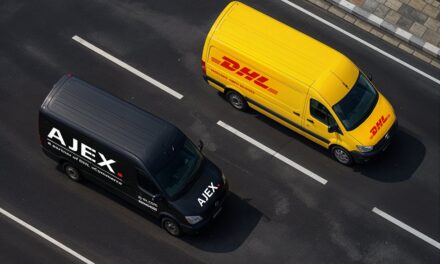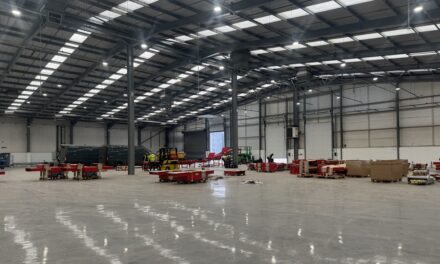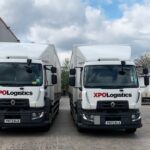
Flying at greater altitude
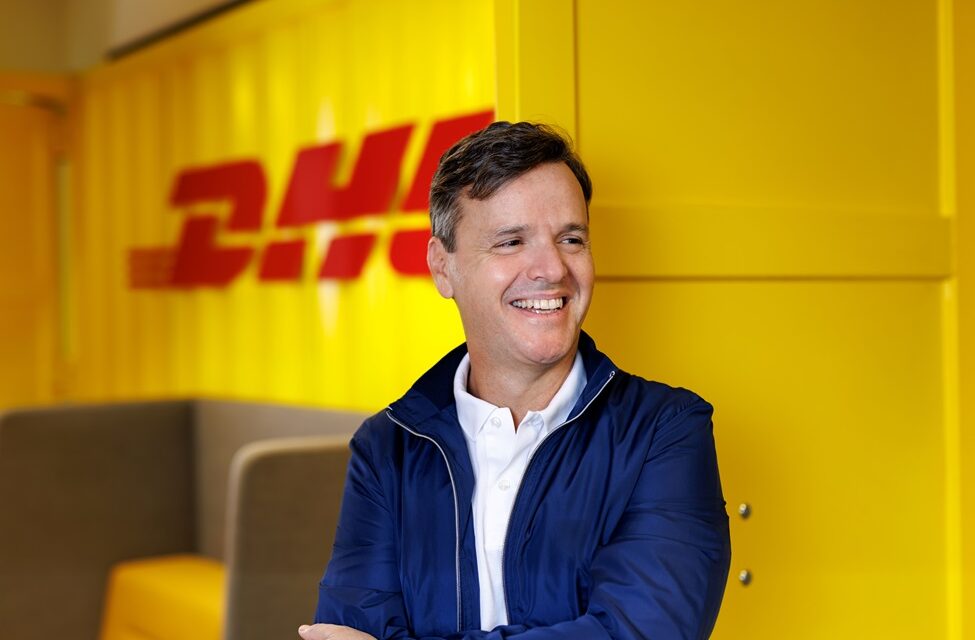
Post & Parcel speaks to Pablo Ciano, CEO of DHL eCommerce, about the increasing demand for diverse delivery options and the growing importance of data in providing real-time information to customers.
In December DHL Parcel UK announced the rebrand to DHL eCommerce – can you tell me the significance of this rebrand and what it means for the company?
When the business unit was established it was originally named DHL eCommerce Solutions and it was always destined to be simplified. At present, the majority of our volume is now coming from e-commerce merchants and e-commerce shippers and almost our entire growth is a related type of business, both on the b2c and b2b sides. The rebrand is a better representation of our business now.
How has Peak gone for DHL eCommerce?
After Black Friday and Cyber Monday, we delivered an outstanding performance and excellent levels of customer satisfaction which I’m delighted about.
You’ve been with DHL for 19 years now, what would you say are the key differences compared to when you started out?
When I started DHL provided mainly traditional doorstep delivery. Today, shippers are asking for a wider range of services – fast or deferred doorstep delivery, or out-of-home delivery into lockers or parcel shops. Customers can now choose whether they want a more sustainable delivery service versus traditional delivery service and there is now the option to use digital tools to divert shipments to different locations.
Another key difference is that customers are asking for more real time tracking data with their shipments so they know where their shipment is and the expected arrival time.
How have DHL’s priorities shifted over the years?
Our first priority will always be our employees. We are still in a business that relies heavily on having 600,000 team members who are highly motivated and safe when they work for us. We always start our meetings and our planning with people first – making sure our people are safe and happy is key. This hasn’t changed since our inception and it will not change.
Over the last 10 years, the sustainability of the organisation and our operations has become another priority. We announced that we want to achieve net-zero emissions by 2050 and our sustainability initiatives have accelerated over the last few years. Our aims are reflected in our strategy where we are allocating 7 billion Euros of investment to decarbonise our operations. We were the first company in the industry that ordered in 2021 electric planes that can carry up to 1,200 kilos. We are also investing in sustainable aviation fuel (SAF), as well as other decarbonised means of transportation such as electric drives for last mile delivery.
Our third priority is around innovation. At DHL we are digitalising our business to increase our efficiency in operations and ultimately customer experience. That is why we’re now also investing in AI. We have a dedicated Centre of Excellence that is looking into how we can use AI to optimise the customer experience and our processes.
Talking about AI, how do you think the sector will use it in the future?
I think that it will be about how AI can support day-to-day functions and processes, for example, we are using AI and advanced data analytics daily to optimise our route planning in parcel delivery. The used tool calculates routes on the basis of courier experience (i.e. considering courier preferences) for roughly 12k districts per day. Assuming ~180-200 shipments per tour, this affects 2.1-2.4 Million shipments per day. We are also using AI to enhance processes and reduce errors in customer service, admin and customs clearance applications. However, it is important to say that nothing will replace moving a package from point A to point B.
We are an analogue business at heart, enabled and significantly optimised by digitalisation. AI will never replace the majority of the work that we are doing, but it will make that work easier and more efficient.
Looking back at your time in the industry, what do you think the sector has done well?
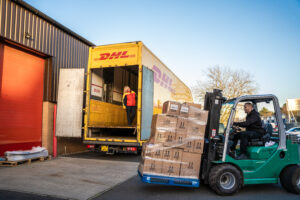 I would say that the sector has done a great job in keeping trade moving, despite so many challenges. From ongoing wars around the world, to new embargo measures popping up, to the impact of COVID, our industry kept global trade moving. We also played a crucial role in the global fight against the pandemic by transporting billions of doses of vaccines and personal protective equipment (PPE) during the lockdown period.
I would say that the sector has done a great job in keeping trade moving, despite so many challenges. From ongoing wars around the world, to new embargo measures popping up, to the impact of COVID, our industry kept global trade moving. We also played a crucial role in the global fight against the pandemic by transporting billions of doses of vaccines and personal protective equipment (PPE) during the lockdown period.
We proved we were able to adapt and work around complexities and we also learnt about the importance of diversification of supply chains, which gives us that extra layer of resilience, that some sectors were perhaps lacking.
The industry has also done an incredible job of elevating the working conditions and the human rights aspects of the many millions of people working in the industry. The majority of our team members are handling packages, moving containers and walking the streets. It is a tough job.
I think that keeping high levels of integrity and safety for those working conditions has been something that the industry has done pretty well in elevating.
Certainly, there is always room for improvement, but I believe that DHL is at the forefront of this endeavour. We have been recognized as the number one Best Workplace by Great Place to Work and have received multiple Top Employer awards. These external endorsements not only validate our current efforts but also serve as a great motivation to continuously strive towards being an employer of choice.
Do you think the industry is good at promoting itself?
We are an industry that is sometimes under-appreciated in terms of the significant role that we play in keeping the world moving. But we can do more to educate the bigger audience and the key stakeholders about the vital role that we play in the economy.
What are the e-commerce trends to look out for in 2024?
Firstly, more demand for different delivery options, which is not completely new, but is accelerating. In particular out-of-home delivery into parcel shops and parcel lockers. In Europe alone, our network of access points is rapidly expanding and currently exceeds 110,000 locations.
Secondly, I think that cross-border returns are an area that is evolving rapidly. Domestic customer returns are a pretty well-established service but cross-border returns, returning an item that was purchased abroad, is an area of e-commerce that is accelerating and an area we need to improve on in terms of customs and duties etc.
The third trend is ongoing, sustainability. Customers are asking for more sustainable options that are less CO2-heavy. We just signed a multi-year agreement with global luxury e-commerce platform Mytheresa to explore how they can use more of our sustainable solutions. This happens for instance via the use of Sustainable Aviation Fuels in air freight. We are talking to around 100 other e-commerce companies too.
How is DHL eCommerce going to tackle the disruption to trade moving through the Red Sea?
We have encountered similar situations in the past, such as the challenges presented by COVID-19. However, we have successfully navigated through those difficulties and found solutions by leveraging our extensive range of logistics services. We have a broad range of services to provide to our customers – from fulfilment all the way to ocean and air freight, as well as cross-border delivery. So, we are well-equipped and will adapt our capabilities to accommodate the challenges.
In this case, it is too early to say how the situation will evolve. We already know that there is some volume being diverted to other ocean routes and also to air freight. We have proven that we can adapt and we will help our customers deliver without a problem.
Do you think the sector needs to work together to help overcome global issues like this?
The sector is already working together in forums like the World Trade Organisation as well as associations that are related to our industry. We usually have a very good relationship with our competitors given that it is a very mature industry that collaborates when needed.
What are you looking forward to achieving this year?
From a group perspective, we want to continue to deliver the high performance that we have seen this last year. In Q1, Q2, Q3, we were able to show that we are flying at a higher altitude compared to pre-pandemic and we are very confident that 2024 is going to be another year where we are going to be able to prove that again.
From a DHL eCommerce perspective, we have recently acquired a fantastic parcel courier company in Turkey called MNG Kargo. So a priority for us this year is to continue integrating that company from a DHL eCommerce perspective. Our goal is to go beyond offering domestic parcel delivery services and seamlessly connect them to our extensive cross-border parcel network. By doing so, we can provide our customers with comprehensive and efficient end-to-end parcel delivery solutions – to and from Turkey.
Another thing we are concentrating on is to continue strengthening our portfolio. We are investing 500 million Euros per year on capital infrastructure. and we are looking into either joint ventures or inorganic moves that are currently confidential. In early March, for example, we will be celebrating the inauguration of our International Logistics Center in Poland, located near Poznan. This collaborative project with our colleagues from Post + Parcel will not only handle domestic shipments but also process cross-border parcel volumes for Germany and the European market.
Finally, we are continuing to expand our business in Europe, the US and India. We have a strategic roadmap in each of these geographies which is growing significantly compared to last year and we will continue to execute the plans with a high level of investment.
About Pablo
Pablo Ciano joined the Management Board of DHL Group in August 2022. He is responsible for DHL eCommerce, which comprises DHL Group’s international parcel delivery operations. The core business covers domestic and cross border parcel deliveries for businesses and consumers across Europe (ex Germany), US, India, Australia, Thailand and Malaysia.
Ciano is an experienced, international manager with extensive expertise in the fields of digitalization of logistics, e-commerce, and sustainability. In his previous role as Executive Vice President Corporate Development, he played a key role in developing DHL Group’s corporate Strategy for 2025 including the sustainability strategy and ESG roadmap as well. Pablo Ciano joined DHL Group in 2005.
Pablo Ciano was born in in Buenos Aires, Argentina.







